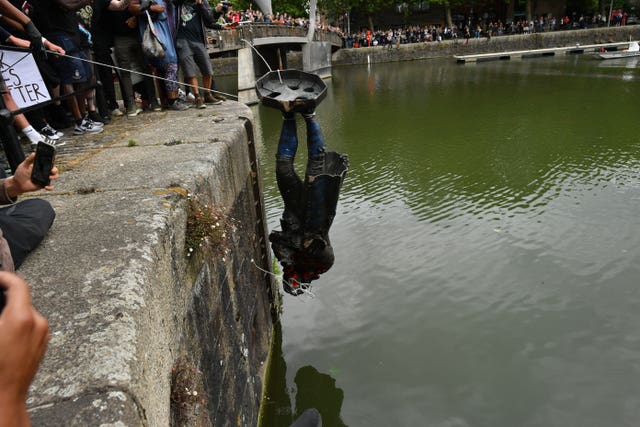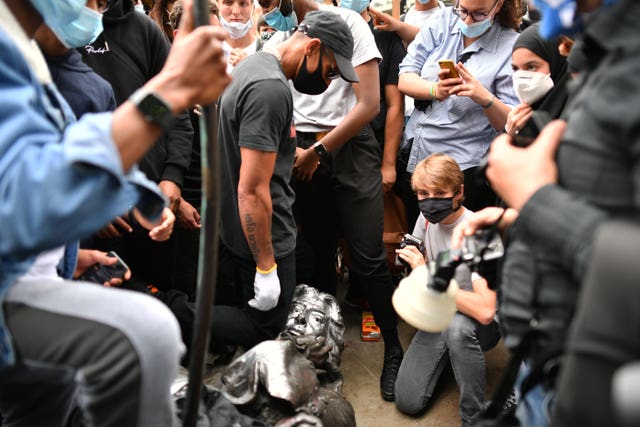
Police have launched an investigation after protesters in Bristol pulled down the controversial statue of a 17th Century slave trader.
The bronze memorial to Edward Colston, situated in the city centre since 1895, was torn down after crowds left the city’s College Green and later was dumped into Bristol harbour.
On Sunday, around 10,000 people took part in the Black Lives Matter demonstration, which was praised by Avon and Somerset police for being “peaceful and respectful”.
No arrest were made, but officers are now said to be collating footage of a “small group of people” who were filmed pulling down the statue with ropes, which police say amounted to criminal damage.
Superintendent Andy Bennett said: “The vast majority of those who came to voice their concerns about racial inequality and injustice did so peacefully and respectfully.
“The ongoing coronavirus pandemic added a different dynamic to what was always going to be a challenging policing operation.”
He added: “However, there was a small group of people who clearly committed an act of criminal damage in pulling down a statue near Bristol Harbourside.
“An investigation will be carried out to identify those involved and we’re already collating footage of the incident.”

Bristol’s mayor, Marvin Rees, said in a statement the removal of the statue would “divide” opinion, but added that it was “important to listen to those who found the statue to represent an affront to humanity and make the legacy of today about the future of our city, tackling racism and inequality”.
Banners left around the Colston statue base will be preserved for display in the M Shed museum.
The statue had been the subject of an 11,000-strong petition to have it removed.
Images showed crowds rushing to stamp on the statue, which stood in Colston Avenue, before it was rolled along the road and pushed into the harbour.
The bridge overlooking the spot where it was thrown into the water is named Pero’s Bridge, after Pero Jones – an enslaved man who lived and died in the city.
After the statue was pulled down, people laid placards on the ground and shouted “no justice, no peace” and “Black Lives Matter”.
Some climbed on top of the plinth to deliver speeches or say a prayer and were widely applauded by the crowd, with vehicles driving past sounding their horns in support.
Statement from Bristol Area Commander Superintendent Andy Bennett following Black Lives Matter demonstration in Bristol 👇 pic.twitter.com/sAXbVBbcAr
— Avon and Somerset Police (@ASPolice) June 7, 2020
Jasmine Boatswain, a graduate PE teacher, and her friends came to see where the statute had stood.
“I need to come here to see this statue come down,” she told the PA news agency.
“To see it ripped down is difficult to put into words. It really embodies the whole movement.
“We are not taking it anymore. We are sick to the teeth of having to experience racism and see racism in our faces.
“Even if you don’t know anything about Black Lives Matter, just looking at this is such a powerful thing.”
Manoel Bolutife Akure described the statute as “PTSD for the city”.
“It is a first of many steps that needs to happen,” Mr Akure said.
“It is crazy to thing we are in a city with Mayor Marvin (Rees) and that statue was still there for years and years and years.
“It doesn’t make sense. This is great and I love that it has happened but there is much more that needs to be done.
“There is so much more that has to be taken down and so much more that needs to be changed.”
Earlier, protester John McAllister, 71, tore down black bin bags used to hide the statue to denounce it in front of fellow protesters.
He said: “It says ‘erected by the citizens of Bristol, as a memorial to one of the most virtuous and wise sons of this city’.
“The man was a slave trader. He was generous to Bristol but it was off the back of slavery and it’s absolutely despicable. It’s an insult to the people of Bristol.”

According to Historic England, the statue was sculpted by John Cassidy, of Manchester, with an inscription that read “erected by citizens of Bristol as a memorial of one of the most virtuous and wise sons of their city AD 1895”.
Colston’s involvement in the slave trade through the British-based Royal African Company was the source of much of the money which he bestowed in Bristol, the website added.
The statue was one of a number of landmarks in Bristol to take Colston’s name, although the nearby music venue Colston Hall will be renamed this year as part of a major refurbishment.
The thousands of protesters had earlier held an eight minute silence – the amount of time George Floyd was held down by a police officer in Minneapolis before he died – before marching through Bristol city centre to Castle Park.
Many wore masks and gloves, but most were unable to keep to the two-metre social-distancing guidelines and were pressed against one another in the city’s narrow streets.


Comments: Our rules
We want our comments to be a lively and valuable part of our community - a place where readers can debate and engage with the most important local issues. The ability to comment on our stories is a privilege, not a right, however, and that privilege may be withdrawn if it is abused or misused.
Please report any comments that break our rules.
Read the rules hereComments are closed on this article